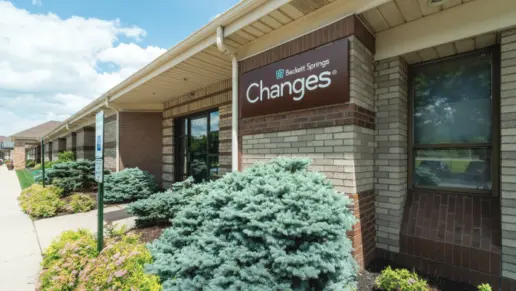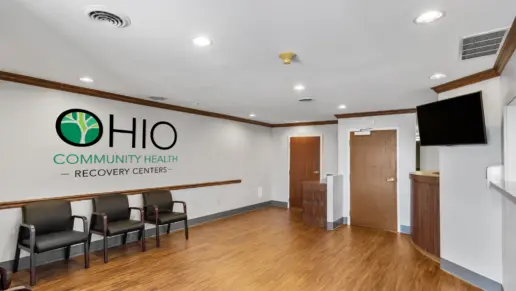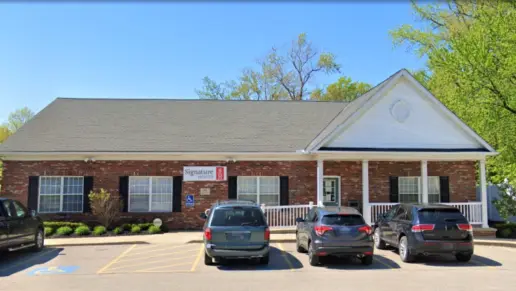About Cincinnati VA Medical Center – Georgetown Community Based Outpatient Clinic
The Georgetown VA Community Based Outpatient Clinic provides treatment for Chemical Dependency and Behavioral Health in an outpatient setting. The Georgetown VA Community Based Outpatient Clinic is located in Georgetown, Ohio.
Cincinnati VA Medical Center – Georgetown Community Based Outpatient Clinic exists “to serve the veteran who served us” through the delivery of timely quality care by staff who demonstrate outstanding customer service. They hope to serve and honor the nation’s veterans following President Lincoln’s promise “To care for him who shall have borne the battle, and for his widow, and his orphan”.
The Partial Hospitalization Program (PHP) is an intensive, time-limited outpatient psychiatric treatment for Veterans with a primary psychiatric illness who do not require hospitalization. The PHP team consists of professionals from psychiatry, psychology, social work, nursing, occupational therapy, and recreational therapy. The primary treatment modality is group therapy, with additional individual case management.
The Psychiatric Emergency Center (PEC) serves as an emergency walk-in clinic for Veterans presenting with a variety of mental health symptoms, including suicidal or homicidal ideation and substance abuse problems. PEC staff assess Veterans, often initiate treatment, and refer Veterans to inpatient or outpatient mental health services within the Cincinnati VA Medical Center.
The Mental Health Intensive Case Management (MHICM) team provides community outreach services to Veterans with longer lasting serious mental health problems. The goal of the MHICM program is to improve the quality of life of Veterans. The Suicide Prevention team helps identify Veterans who are at high risk for suicide and coordinates enhanced care as needed. The Suicide Prevention team also provides public relations and community education/outreach regarding suicide prevention.
Healthcare for Homeless Veterans (HCHV) is an outreach program for homeless Veterans including those with mental health and substance abuse problems. They help them find and use VA services along with community resources to end homelessness and improve their mental, emotional and physical health
The Military Sexual Trauma (MST) Program provides assistance to all Veterans with any VA healthcare issues related to MST.
This includes: education about lifetime free MST-related healthcare at VA for Veterans endorsing MST; individual consultation regarding MST healthcare needs, including treatment and billing problems related to MST-care; connection to any needed VA resources for healthcare, including mental health care; coordination with Veteran Service Officers for exploration of Service Connection, if appropriate, and the courage Group (12 week psychotherapy group for Veterans who experienced MST)
Mental Health Clinics are located throughout the Cincinnati VA Medical Center, including the main hospital and Community Based Outpatient Clinics (CBOCs). Mental Health Clinics are staffed by psychiatrists, psychologists, social workers, and nurses who treat Veterans with a variety of mental health problems such as depression, anxiety, and psychosis.
The Substance Abuse/Posttraumatic Stress Disorder (SA/PTSD) program provides services to Veterans with both substance abuse and Posttraumatic Stress Disorder (PTSD). Utilizing the evidence-based Seeking Safety model, the SA/PTSD program offers structured group therapy. Motivational Interviewing and limited individual therapy are also available.
Latest Reviews
Rehab Score
Other Forms of Payment
Private insurance refers to any kind of healthcare coverage that isn't from the state or federal government. This includes individual and family plans offered by an employer or purchased from the Insurance Marketplace. Every plan will have different requirements and out of pocket costs so be sure to get the full details before you start treatment.
Self-pay involves paying for treatment out of your own pocket. You can use savings or credit, get a personal loan, or receive help from family and friends to fund your treatment. If you don't have insurance or your insurance plan doesn't cover a specific program, self-pay can help ensure you still get the care you need.
Military members, veterans, and eligible dependents have access to specific insurance programs that help them get the care they need. TRICARE and VA insurance can help you access low cost or no cost addiction and mental health treatment. Programs that accept military insurance often have targeted treatment focused on the unique challenges military members, veterans, and their families face.
Financial aid can take many forms. Centers may have grants or scholarships available to clients who meet eligibility requirements. Programs that receive SAMHSA grants may have financial aid available for those who need treatment as well. Grants and scholarships can help you pai for treatment without having to repay.
Addiction Treatments
Levels of Care
Treatments
The goal of treatment for alcoholism is abstinence. Those with poor social support, poor motivation, or psychiatric disorders tend to relapse within a few years of treatment. For these people, success is measured by longer periods of abstinence, reduced use of alcohol, better health, and improved social functioning. Recovery and Maintenance are usually based on 12 step programs and AA meetings.
Drug rehab in Ohio provides comprehensive treatment to address the physical and psychological needs of those struggling with substance use disorders. This may involve inpatient and/or outpatient care.
The Intensive Dual Diagnosis Treatment program provides outpatient services to Veterans who suffer from co-occurring substance use and serious psychiatric disorders. Group and individual therapy are provided, including insight-oriented therapy, supportive therapy, skill-building, and trauma work. Particular focus is on a multidisciplinary team approach to treatment.
A combined mental health and substance abuse rehab has the staff and resources available to handle individuals with both mental health and substance abuse issues. It can be challenging to determine where a specific symptom stems from (a mental health issue or an issue related to substance abuse), so mental health and substance abuse professionals are helpful in detangling symptoms and keeping treatment on track.
Opioid rehabs specialize in supporting those recovering from opioid addiction. They treat those suffering from addiction to illegal opioids like heroin, as well as prescription drugs like oxycodone. These centers typically combine both physical as well as mental and emotional support to help stop addiction. Physical support often includes medical detox and subsequent medical support (including medication), and mental support includes in-depth therapy to address the underlying causes of addiction.
Programs




Clinical Services
Cognitive Behavioral Therapy (CBT) is a therapy modality that focuses on the relationship between one's thoughts, feelings, and behaviors. It is used to establish and allow for healthy responses to thoughts and feelings (instead of unhealthy responses, like using drugs or alcohol). CBT has been proven effective for recovering addicts of all kinds, and is used to strengthen a patient's own self-awareness and ability to self-regulate. CBT allows individuals to monitor their own emotional state, become more adept at communicating with others, and manage stress without needing to engage in substance abuse.
Whether a marriage or other committed relationship, an intimate partnership is one of the most important aspects of a person's life. Drug and alcohol addiction affects both members of a couple in deep and meaningful ways, as does rehab and recovery. Couples therapy and other couples-focused treatment programs are significant parts of exploring triggers of addiction, as well as learning how to build healthy patterns to support ongoing sobriety.
Dialectical Behavior Therapy (DBT) is a modified form of Cognitive Behavioral Therapy (CBT), a treatment designed to help people understand and ultimately affect the relationship between their thoughts, feelings, and behaviors. DBT is often used for individuals who struggle with self-harm behaviors, such as self-mutilation (cutting) and suicidal thoughts, urges, or attempts. It has been proven clinically effective for those who struggle with out-of-control emotions and mental health illnesses like Borderline Personality Disorder.
The Treatment Recovery and Activity Center (TRAC) program focuses on Veterans’ Strengths Needs Abilities and Preferences and is considered the last link between the hospital and the community. The program can help Veterans cope with mental illness, deal with activities of daily living, adjust to life’s challenges, develop the skills to live life to the fullest, and avoid hospitalization.
Research clearly demonstrates that recovery is far more successful and sustainable when loved ones like family members participate in rehab and substance abuse treatment. Genetic factors may be at play when it comes to drug and alcohol addiction, as well as mental health issues. Family dynamics often play a critical role in addiction triggers, and if properly educated, family members can be a strong source of support when it comes to rehabilitation.
Group therapy is any therapeutic work that happens in a group (not one-on-one). There are a number of different group therapy modalities, including support groups, experiential therapy, psycho-education, and more. Group therapy involves treatment as well as processing interaction between group members.
In individual therapy, a patient meets one-on-one with a trained psychologist or counselor. Therapy is a pivotal part of effective substance abuse treatment, as it often covers root causes of addiction, including challenges faced by the patient in their social, family, and work/school life.
The Cincinnati VA Medical Center’s Community Employment Services provides information, pre-employment assessment and workforce re-entry planning services, linkage, and coordination for VA and non-VA services, and community based follow-up services to integrate Veterans into the community through competitive employment. The Compensated Work Therapy program (CWT) provides vocational opportunities for Veterans seeking employment.
Motivational Interviewing (MI) is a clinical approach to helping people with substance abuse issues and other conditions shift behavior in positive ways. It is more goal-oriented than traditional psychotherapy, as MI counselors directly attempt to get clients to consider making behavioral change (rather than wait for them to come to conclusions themselves). Its primary purpose is to resolve ambivalence and help clients become able to make healthy choices freely.
All Veterans referred to the tobacco treatment center receive a comprehensive individualized assessment, which includes a clinical interview, CO monitoring, and a blood pressure screening. Tobacco treatment intervention options include medications, classes, and individual counseling. Tobacco treatment classes occur at different times during the day and evening at the main hospital and CBOCs.
Nutrition and Food Services (NFS) provides counseling services for outpatient veterans for the Cincinnati and Fort Thomas Divisions and the Community Based Outpatient Clinics. NFS also provides healthy meals for Veterans admitted to the Medical Center. Nutrition Counseling for all medical conditions: Move weight control programs, Diabetes, Hypertension, Heart Disease and etc.
Each program provides assessment and brief treatment of PTSD. The trauma is addressed using Cognitive Processing Therapy in individual and group sessions. Additional therapy groups include Anger Management, Relaxation Skill Training, Assertiveness Training, Distress Tolerance, Communication Training, Sleep Management, and Health Issues.
Amenities
-
Residential Setting
-
Private Setting
Accreditations

The Joint Commission, formerly known as JCAHO, is a nonprofit organization that accredits rehab organizations and programs. Founded in 1951, the Joint Commision's mission is to improve the quality of patient care and demonstrating the quality of patient care.
Joint Commission Accreditation: Yes
Accreditation Number: 2417

The Substance Abuse and Mental Health Services Administration (SAMHSA) is a branch of the U.S. Department of Health and Human Services. Established in 1992 by congress, SAMHSA's mission is to reduce the impact of substance abuse and mental illness on American's communities.
SAMHSA Listed: Yes
Contact Information
474 Home Street
Georgetown, OH 45121


